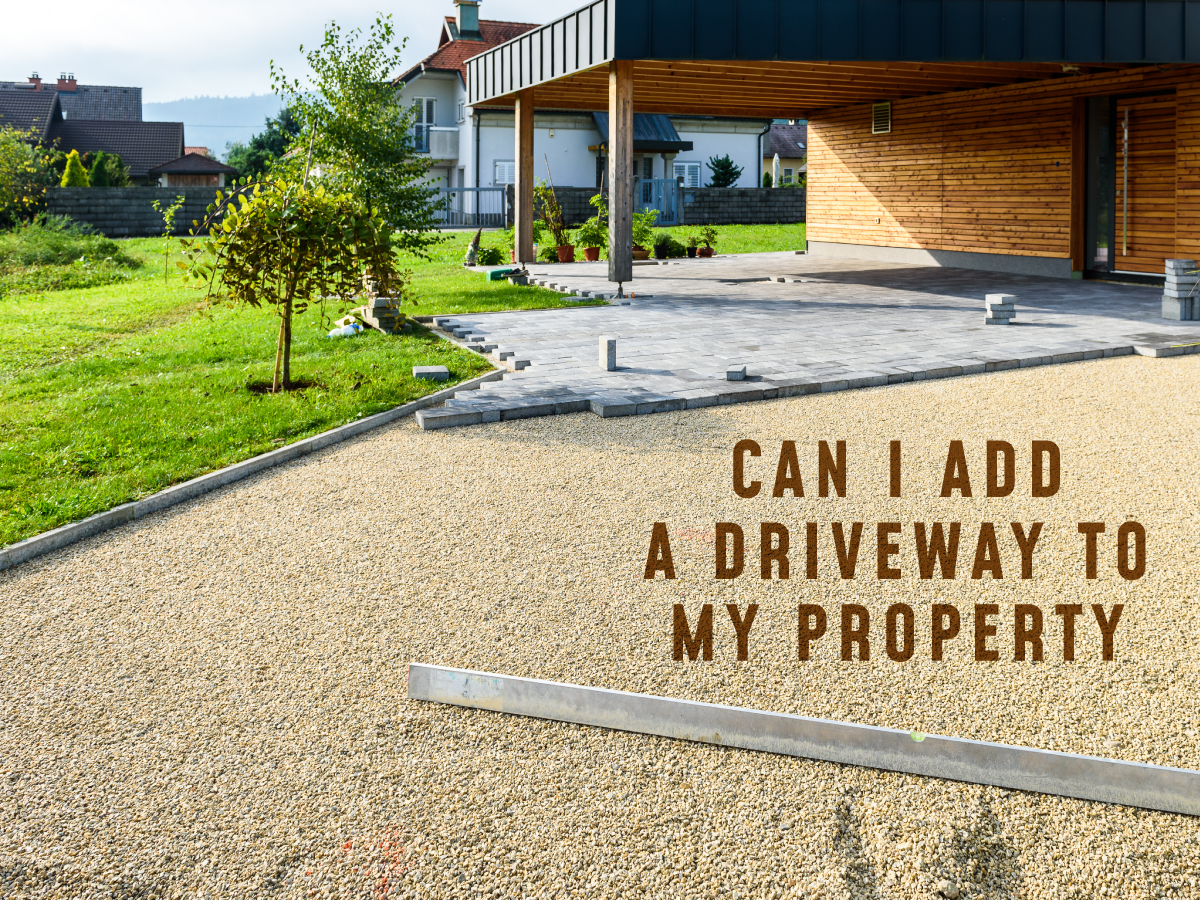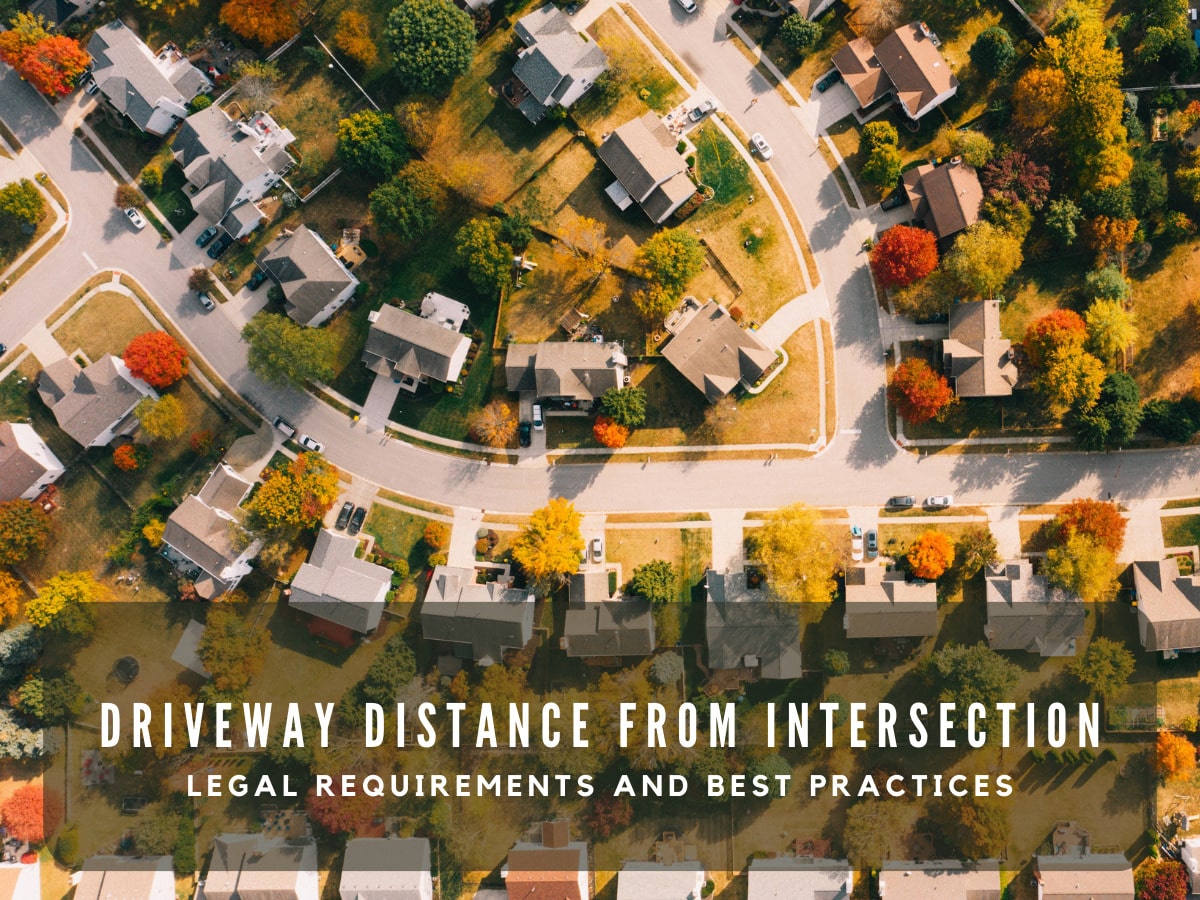Adding a driveway to your property can have surprising benefits and challenges. Therefore, before embarking on this project, it's essential to understand the basics of adding a driveway, the legalities involved, and the pros and cons that come with this type of project.
We will also take a look at how to choose the right driveway for your property and look into some options for installation to determine which best suits your needs. So let’s take a look at some basic concepts before delving into the details.
What are Driveways?
A driveway is a private road that connects a property to the main road, allowing vehicles to access the property and creating an extra parking area for homeowners. Driveways are also known to enhance your home’s curb appeal, making it a popular home improvement project.
The Process of Adding a Driveway to Your Property
Before embarking on this home improvement project, it's crucial to understand the basic steps that are necessary to ensure a successful installation. So let’s take a look at what it takes to add a driveway to your property.
- Start with a clear vision of your driveway's purpose, and keep this initial idea in mind throughout the entire process.
- Consider the number of vehicles you plan to accommodate and the driveway's connection to the road to provide clarity on the design of your layout.
- Check with your local government to understand zoning laws, building codes, and any restrictions that apply to driveway construction to avoid hefty fines.
- Select the material for your driveway, which will affect its appearance, durability, maintenance requirements, and cost.
- When it comes to material selection, research multiple options to see which best suits your needs, budget, and local climate conditions.
- Each material has its pros and cons, so research thoroughly to determine which best suits your needs, budget, and local climate conditions.
- Create a solid base layer to provide stability and support for the surface material you selected.
- Plan for the installation of drainage systems, such as culverts or channels, to direct water away from the driveway and avoid any potential damage to the material.
- If you don’t have experience with this type of construction, hire a professional contractor to ensure that the work meets all legal standards, is structurally sound, and looks great.
- When searching for contractors, research multiple options to find one that best suits your needs, time, and budget.
- After installation, create a regular maintenance schedule, which should include sealing cracks, removing strains, and cleaning the material to extend your driveway’s lifespan.
Adding a driveway to your private property requires careful planning, adherence to legal regulations, and thoughtful material selection to ensure that your new driveway not only enhances the functionality and appeal of your property but also stands the test of time.
So, now that we have taken a look at some of the basics when it comes to driveway installations, let’s delve into these details to determine if this home renovation project is the way to go for you.
The Legal Aspects of Adding a Driveway to Your Property
Before starting the driveway addition process, it's crucial to understand the legal aspects involved, given that you will likely need to obtain the necessary permits and adhere to local regulations.
Each city or municipality may have different requirements, so it's important to research and consult with the appropriate authorities. However, there is a main process that you can follow to better understand the legal aspects of adding a driveway to your property, so let’s take a look:
- The first step to adding a driveway to your property legally is to determine whether you need a permit to proceed with the construction.
- Then you must familiarize yourself with the local regulations on driveway construction, which cover aspects like the size, materials used, and distance from the property line.
- Ensure that the proposed driveway area is within your property lines and does not encroach on neighboring properties or public areas.
- Consider any existing easements or rights of way that may affect the driveway construction.
- Do thorough research on environmental regulations that may apply to driveway construction.
- Consider the homeowners' associations in the guidelines or design standards that must be followed to maintain the visual appeal of the community.
By taking these factors into account during the planning phase, you will ensure a smooth and legally compliant driveway addition process. Now let’s take a look at some pros and cons of adding a driveway to your property to further help you make your decision.
The Pros and Cons of Adding a Driveway to Your Property
Adding a driveway to your property is more than just a practical upgrade; it's a strategic enhancement that can bring a multitude of benefits. However, as with any home improvement project, it doesn't come without its challenges. So let’s get into the pros and cons of getting a driveway to determine if it suits your needs.
|
Pros |
Cons |
|
A driveway can significantly boost your home's market appeal and value, offering a solid return on investment. |
The initial and long-term costs of materials, construction, and maintenance can add up. |
|
With various materials and designs, driveways contribute to a polished and inviting home exterior. |
Building a driveway can take weeks or months, potentially causing noise, dust, and limited property access. |
|
Driveways allow you to enjoy the luxury of a private parking space while avoiding the hassle of street parking. |
Visitor access may be disrupted, necessitating temporary parking or schedule adjustments. |
|
They offer increased safety, reducing the risk of accidents or vandalism. |
Ongoing care, such as sealing, cleaning, or repairs, is necessary to preserve the driveway's condition and appearance. |
|
They double as areas for play, entertainment, or even gardening, further increasing the value of this space in your home. |
Local weather patterns may dictate additional protective measures to increase the driveway’s durability. |
|
The flexibility of private parking simplifies vehicle management, especially when hosting your friends and family. |
Ensuring the driveway complements your property's style may require professional design input. |
|
They provide a safe spot for vehicles during bad weather, minimizing contact with mud or debris. |
Adding a driveway to your property will increase your maintenance in general, given that it also needs care. |
|
The parking spaces that come with driveways help preserve your lawn and landscaping, leading to savings on property upkeep. |
Driveways can limit the amount of space available for gardens, which can hinder the greenery on the exterior of your home. |
Overall, while adding a driveway can provide convenience and functionality, it's crucial to carefully consider the challenges and drawbacks associated with the project. By understanding these aspects, you can make an informed decision that aligns with your needs and budget.
However, now that we have understood what driveways are, the process that goes into adding them to your property, and the benefits and challenges you could gain from them, let’s delve deeper into the aspects to consider in order to get the right driveway for your property.
The 6 Aspects to Consider when Choosing a Driveway for Your Property
When it comes to choosing a driveway for your property, there are several factors to consider. So let’s take a closer look at the factors you need to consider in order to ensure a successful installation that meets your needs and budget.
1) The Material
When selecting the material you want to make your driveway out of, there are multiple options on the market, so let’s take a look at the most popular so you can make an informed decision:
|
Material |
Characteristics |
|
Asphalt |
It’s affordable, easy to install, and provides a smooth surface suitable for areas with moderate to heavy traffic. |
|
Concrete |
It offers a more durable and long-lasting solution and can withstand heavy loads with minimal maintenance. |
|
Gravel |
They have a rustic charm and are cost-effective, but they may require frequent maintenance and can be challenging to shovel snow from. |
|
Pavers |
They are more expensive, but they offer a wide range of designs and can add a further touch of elegance to your home, further enhancing its curb appeal. |
Once you know what type of material you need, you need to consider the size and layout of your driveway, so let’s get into how to get the correct measurements.
2) The Size
After you know what type of material you need, assess how many vehicles you need to accommodate and consider any future changes, such as the addition of a garage or carport. If you have multiple vehicles or frequently have guests, a wider driveway may be necessary.
3) The Layout
The layout should be practical and allow for easy maneuverability of vehicles. For example, a curved driveway can add visual interest and improve traffic flow, while a straight driveway may be more suitable for properties with limited space.
4) The Climate
Another factor to consider is the climate in your area. If you live in a region with harsh winters, you may want to choose a material that can withstand freezing temperatures and the use of de-icing chemicals.
Some great options for cold weather where it regularly snows are concrete or pavers, which are generally more resistant to the damage caused by freezing and thawing cycles compared to asphalt and gravel.
5) The Aesthetics
Furthermore, it's essential to think about the overall aesthetics of your driveway, given that it should complement the style of your property and enhance its curb appeal. For example, if you have a modern home, a sleek concrete or paver driveway might be the perfect match.
On the other hand, if you have a traditional or rustic-style property, a gravel or brick driveway could be more fitting to the visual appeal of that aesthetic. Ultimately, the decision will be up to you. Just keep in mind that your driveway could add or subtract value to your home.
6) Your Budget
Don't forget to consider your budget and the type of material you select, the installation costs, and the cost of maintenance. However, the main expense is the cost of the material.
If you have a large budget, consider paver or concrete, which are more costly but require less maintenance. If you prefer to go cheaper, you could select asphalt or gravel, given that they are cheaper options, though they require more maintenance in the long haul.
Ultimately, choosing the right driveway for your property involves careful consideration of various factors. By taking the time to research and consult with professionals, you can ensure that your driveway not only serves its practical purpose but also adds value to your property.
Once you have decided the size, layout, budget, and material of your driveway, you have one last decision to make. Should you go at it yourself or hire a professional? Let’s get into some pros and cons for each so you can decide for yourself.
Calling the Professionals vs. A DIY Driveway Installation
When it comes to driveway installation, you have the option to hire professionals or tackle the project yourself and each approach has its pros and cons. So let’s analyze the differences to allow you to make an informed decision:
|
Type of Installation |
Pros |
Cons |
|
Professional |
They offer expertise for a high-quality installation. |
Hiring a professional can come at a higher cost due to the labor expenses and the additional fees you need to pay their workers. |
|
They have the skills and experience to install it correctly. |
||
|
They have access to specialized tools and machinery. |
||
|
They save you time as they handle the permits and paperwork. |
You will need to do extensive research on the contractors available to ensure the best quality and price. |
|
|
They make sure you’re in compliance with local regulations. |
||
|
They might be able to get you a better price on the material. |
||
|
Do it Yourself |
This route offers cost savings on labor. |
It requires planning, research and physical labor. |
|
It gives you the opportunity to learn new skills. |
You take on the risk of subpar results without proper know-how. |
|
|
It gives you a sense of accomplishment when done. |
It can be time consuming and have a steep learning curve for newbies. |
|
|
You gain full control over the project timeline and execution. |
It can lead to costly repairs if the installation isn’t done correctly. |
Whether you choose to hire professionals or embark on a DIY driveway installation, it is important to weigh the pros and cons of each approach. Consider your budget, time constraints, and level of expertise before making a decision.
Whichever option you choose, remember that a well-installed driveway can enhance the curb appeal of your property, increase the value of your home, and provide a durable and functional surface for years to come!
Is a Driveway Right for Your Property?
Adding a driveway to your property can bring numerous benefits, including increased property value, enhanced curb appeal, and additional parking space. However, it's essential to consider the challenges and legalities involved to make the right decisions.
Before proceeding with any driveway project, take the time to conduct thorough research, consult with professionals, and carefully assess your property's needs and circumstances. By doing so, you can determine if adding a driveway is the right choice for your property and make an informed decision that will benefit you in the long run!








